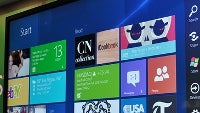Windows 8 ARM tablets kinda, sorta, maybe will have desktop UI available?

Despite the excitement of new Windows 8 tablets concept hardware, and expectations of seeing a consumer preview as soon as MWC, it can be surprising how much we don’t know about the tablet-version of the operating system. We know that ARM-based tablets will run Windows 8, not Windows Phone 8 – but it’s no longer clear how big of a difference that will entail; it was recently revealed that the two operating systems will share the same kernel and much of the same code base.
One thing we thought we knew late last year was that that Microsoft was going to remove the desktop portion of the UI from ARM-based tablets. Today that is being questioned, as the Building Windows 8 blog discussed desktop app-optimization in a way that clouds the issue. The specific part of the blog in question is:
As you can see, the blog is referring to optimizing both desktop and Metro-style apps for extended battery life, and specifically refer to SoC-based computers (e.g. mobile devices) as the prime example of the “connected standby” power saving mode they are looking for.
But does this mean Microsoft will be enabling the desktop UI on tablets?
Despite several articles to the contrary, it’s not actually clear that is what they developers blog is saying. The blog is discussing how to make Windows 8 desktop-style apps get better battery life using Metro-style (i.e. mobile-based) apps as an example of how to make it work, and how they want desktop app developers to learn to think about app development. Whether this means they want to increase the battery performance of desktop apps on tablets, or simply the battery life of traditional laptops isn’t 100% clear.
Also not clear is whether this is a true apples to apples comparison. The report from last year merely indicated that the desktop user interface was not going to be exposed on tablets, so you couldn’t switch between the Metro desktop and the “legacy” desktop. It’s not clear why that would have to change if desktop apps could be launched from within the Metro UI. Sure, some users might find it inelegant to launch the desktop version of Excel from the Metro UI, but presumably the people who actually needed to use the desktop version wouldn’t mind, as long as battery life wasn’t compromised.
No matter what the final result is, it’s almost certain that apps designed for traditional x86 desktop/laptop processors will not run on ARM tablets, regardless of the UI that is exposed; they will have to be recompiled to run on ARM instruction sets. So unless Windows 8 tablets quickly supplant traditional windows computers, there will always be fewer “desktop-style” apps available to run on your tablet than on your laptop or home gaming rig.
Should Microsoft make the desktop UI available on ARM tablets? Should they just let you launch (recompiled) desktop apps from the Metro UI? Should they dump desktop apps altogether from tablets? Let us know what you think!
source: Windows 8 Developers via ZDNet, electronista
“Typically based on “System on Chip” (SoC) architectures, these PCs are interesting because instead of turning off during periods of inactivity they go into a very low power state while still running. This new state is referred to as “connected standby.” This enables some great connected scenarios, such as always having email up-to-date, and being able to receive instant messages or phone calls, while still delivering amazing battery life. The chart below shows behavior for both desktop and Metro style apps during connected standby. For this to really work effectively though, we had to consider both Metro style apps (which, as you saw earlier, we can very effectively ensure are conservative with system resources), as well as desktop applications…”
As you can see, the blog is referring to optimizing both desktop and Metro-style apps for extended battery life, and specifically refer to SoC-based computers (e.g. mobile devices) as the prime example of the “connected standby” power saving mode they are looking for.
Despite several articles to the contrary, it’s not actually clear that is what they developers blog is saying. The blog is discussing how to make Windows 8 desktop-style apps get better battery life using Metro-style (i.e. mobile-based) apps as an example of how to make it work, and how they want desktop app developers to learn to think about app development. Whether this means they want to increase the battery performance of desktop apps on tablets, or simply the battery life of traditional laptops isn’t 100% clear.
Also not clear is whether this is a true apples to apples comparison. The report from last year merely indicated that the desktop user interface was not going to be exposed on tablets, so you couldn’t switch between the Metro desktop and the “legacy” desktop. It’s not clear why that would have to change if desktop apps could be launched from within the Metro UI. Sure, some users might find it inelegant to launch the desktop version of Excel from the Metro UI, but presumably the people who actually needed to use the desktop version wouldn’t mind, as long as battery life wasn’t compromised.
Should Microsoft make the desktop UI available on ARM tablets? Should they just let you launch (recompiled) desktop apps from the Metro UI? Should they dump desktop apps altogether from tablets? Let us know what you think!
source: Windows 8 Developers via ZDNet, electronista
Follow us on Google News













Things that are NOT allowed:
To help keep our community safe and free from spam, we apply temporary limits to newly created accounts: